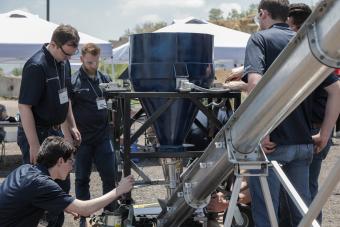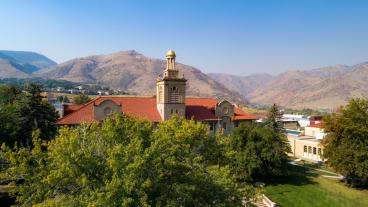Lockheed Martin, Mines announce winner of inaugural Over the Dusty Moon Challenge

The Laurentian Lunars, of Laurentian University in Greater Sudbury, Canada, took the top prize at the Over the Dusty Moon Challenge.
GOLDEN, Colorado (June 7, 2022) -- Colorado School of Mines and Lockheed Martin are proud to announce the winners of the inaugural Over the Dusty Moon Challenge.
Five university teams from around the world descended on the Mines campus June 2-3 to demonstrate the systems they designed and built for moving lunar dirt, or regolith, around the Moon’s surface. Judging focused on the amount of regolith simulant transported, system mass, energy consumed, dust tolerance and generation, autonomy and overall performance.
Officially announced at the Space Resources Roundtable, one of the premier international events bringing together industry, government and finance to discuss issues related to the In-Situ Resource Utilization (ISRU) of lunar, Martian and asteroid resources, the winning teams are:
- 1st place: Laurentian Lunars (Laurentian University in Greater Sudbury, Canada)
- 2nd place: SpaceTeam AGH (AGH University of Science and Technology in Krakow, Poland)
- 3rd place: Team UNSW (University of New South Wales in Sydney, Australia)
“The teams in this year’s Over the Dusty Moon Challenge developed creative and well-designed systems for moving regolith on the Moon,” said Lisa D. May, Commercial Civil Space NextGen Strategy Lead, Lockheed Martin Space. “Lockheed Martin and our engineers are proud to support to this event and share our engineering expertise as judges. I’m excited for the opportunity to participate and interact with the student teams. Their great work on this challenge will benefit them and the space industry.”
“We had a fantastic event with five teams from around the world running their systems over two days on the Mines campus,” said Kevin Cannon, assistant professor of geology and geological engineering who is on faculty in Mines’ Space Resources program. “The winning team, Laurentian Lunars from Canada, had a flawless run and delivered all the required regolith in just over 10 minutes.”
Judging the student design competition were Rob Mueller, Senior Technologist, Kennedy Space Center, NASA; Lisa D. May, Commercial Civil Space NextGen Strategy Lead, Lockheed Martin Space; Eamon Carrig, Director of Off-Planet Systems, ICON; Ryan Dubisher, Spacecraft Technology Development Lab, Lockheed Martin Space; and Joseph Minafra, Lead for Innovation and Technical Partnerships, Ames Research Center, NASA.
The five teams competing in the finals hailed from five countries on three continents. Universities sending teams were RWTH Aachen in Germany, Laurentian University in Canada, University of New South Wales in Australia, AGH University of Science and Technology in Poland, and Colorado School of Mines.




